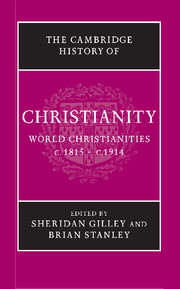Book contents
- Frontmatter
- 1 Introduction
- PART I CHRISTIANITY AND MODERNITY
- 2 The papacy
- 3 Theology and the revolt against the Enlightenment
- 4 The growth of voluntary religion
- 5 Catholic revivalism in worship and devotion
- 6 Women preachers and the new Orders
- 7 Church architecture and religious art
- 8 Musical trends and the western church: a collision of the ‘ancient’ and ‘modern’
- 9 Christianity and literature in English
- 10 Christian social thought
- 11 Christianity and the sciences
- 12 History and the Bible
- 13 Popular religion and irreligion in countryside and town
- PART II THE CHURCHES AND NATIONAL IDENTITIES
- PART III THE EXPANSION OF CHRISTIANITY
- Select General Bibliography
- Chapter Bibliography
- Index
- References
9 - Christianity and literature in English
from PART I - CHRISTIANITY AND MODERNITY
Published online by Cambridge University Press: 28 March 2008
- Frontmatter
- 1 Introduction
- PART I CHRISTIANITY AND MODERNITY
- 2 The papacy
- 3 Theology and the revolt against the Enlightenment
- 4 The growth of voluntary religion
- 5 Catholic revivalism in worship and devotion
- 6 Women preachers and the new Orders
- 7 Church architecture and religious art
- 8 Musical trends and the western church: a collision of the ‘ancient’ and ‘modern’
- 9 Christianity and literature in English
- 10 Christian social thought
- 11 Christianity and the sciences
- 12 History and the Bible
- 13 Popular religion and irreligion in countryside and town
- PART II THE CHURCHES AND NATIONAL IDENTITIES
- PART III THE EXPANSION OF CHRISTIANITY
- Select General Bibliography
- Chapter Bibliography
- Index
- References
Summary
In a letter written the day before he died Charles Dickens insisted that he had ‘always striven in [his] writings to express veneration for the life and lessons of Our Saviour’. He felt constrained to add, however, that he had ‘never made proclamation of this from the house tops’. Dickens was responding to a correspondent’s complaint that he had made a flippant reference to Scripture in a passage in Edwin Drood. His forceful response is two-edged. He protests that his religious faith is implicit in what he had written, but that he had been disinclined to express that faith explicitly. Not a regular churchgoer, he attended a Unitarian chapel occasionally in the 1840s. Dickens’s response can be seen as typical of a great deal of the literature in English produced in the first two-thirds of the nineteenth century. It is a literature that can best be described as Christian in its broad cultural context and Christian in its moral ethos, but rarely is it specifically propagandist in intent, confessional in inspiration or dogmatically defined. This is particularly true of the dominant genre in nineteenth-century literature, the novel. Dickens’s description of the implicit Christian moral base of his work could equally be applied to that of Jane Austen, the daughter and sister of clergymen, Charlotte Bronté, the daughter and wife of clergymen, Mrs Gaskell, the wife of a Unitarian minister, and Nathaniel Hawthorne. It could even describe much of the work of that devout agnostic among the mid-Victorian novelists, George Eliot. Explicit religious conviction often fared badly, especially Protestant Nonconformity, which was ‘everywhere spoken against’ in fiction, nowhere more so than in Dickens, with a figure like Mr Chadband. It should, however, come as no surprise that two great Russian novelists, Tolstoy and Dostoevsky, would admire Dickens as a popular disseminator of the gospel and that Dostoevsky would recognise in Mr Pickwick a type of the ‘absolute beauty’ he saw as supremely embodied in Christ.
- Type
- Chapter
- Information
- The Cambridge History of Christianity , pp. 136 - 141Publisher: Cambridge University PressPrint publication year: 2005

